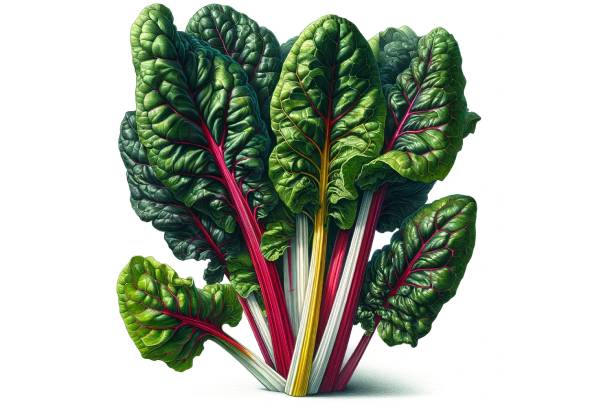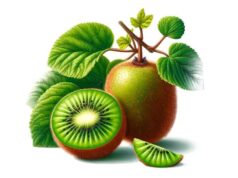What is Swiss Chard?
Swiss chard, scientifically known as Beta vulgaris subsp. cicla, is a leafy green vegetable from the same family as beets and spinach. Swiss chard, which originated in the Mediterranean region, has been a staple of many cultures’ diets for centuries. It is known not only for its bright colors, which range from deep green leaves to white, yellow, or red stalks, but also for its high nutritional value. In the nineteenth century, seed catalog publishers used the name “Swiss chard” to distinguish it from French spinach varieties.
Swiss chard is well-known for its benefits to overall health. It contains essential vitamins, minerals, and antioxidants, making it a nutritional powerhouse that supports a variety of bodily functions. It has long been used in traditional medicine to treat a wide range of ailments, including inflammation and digestive problems. Today, Swiss chard is known for its ability to promote heart health, boost the immune system, and, in particular, improve eye health. Its high concentration of carotenoids, vitamins A, C, and K, as well as other beneficial compounds, make it a must-have food for anyone looking to improve or maintain vision.
Essential Nutrients in Swiss Chard
Swiss chard is a nutrient-dense vegetable that contains a variety of vitamins, minerals, and antioxidants that promote overall health, particularly eye health. Here’s a detailed breakdown of the main nutrients found in Swiss chard:
- Vitamin A: Swiss chard is high in vitamin A, particularly beta-carotene. One cup of cooked Swiss chard contains approximately 44% of the daily recommended intake. Vitamin A is essential for maintaining clear vision, immune function, and skin health.
- Vitamin C: Swiss chard contains significant amounts of this potent antioxidant. One cup of raw Swiss chard contains approximately 18% of the daily recommended amount of vitamin C. This vitamin protects the eyes from free radical damage and promotes the health of ocular blood vessels.
- Vitamin K: Swiss chard is an excellent source of vitamin K, which is required for blood clotting and bone health. One cup of cooked Swiss chard provides more than 700% of the daily recommended intake, making it an extremely rich source of this essential nutrient.
- Vitamin E: Swiss chard is a good source of vitamin E, another powerful antioxidant. It protects eye cells from damage and promotes overall eye health. One cup of cooked Swiss chard contains roughly 17% of the daily recommended intake.
- Lutein and Zeaxanthin are the most important nutrients in Swiss chard for eye health. Swiss chard is particularly high in carotenoids, which are concentrated in the macula, the part of the retina responsible for central vision. Lutein and zeaxanthin act as natural sunblocks, absorbing harmful blue light and shielding the eyes from oxidative damage.
- Folate (Vitamin B9): Swiss chard contains a substantial amount of folate, which is required for DNA synthesis and repair. One cup cooked Swiss chard provides approximately 15% of the daily recommended intake.
- Magnesium: Swiss chard contains magnesium, which helps to regulate muscle and nerve function, blood sugar levels, and blood pressure. One cup cooked Swiss chard provides approximately 38% of the daily recommended intake.
- Calcium: This leafy green contains calcium, which is essential for maintaining strong bones and teeth. One cup of cooked Swiss chard contains approximately 10% of the daily recommended intake.
- Potassium: Swiss chard contains potassium, an important mineral that regulates blood pressure, balances fluids, and supports muscle and nerve function.
- Iron: Swiss chard contains iron, which is essential for blood health and energy production. A cup of cooked Swiss chard provides approximately 22% of the daily recommended intake for men and 10% for women.
Swiss Chard’s Impact on Eye Health
Swiss chard has numerous eye-health benefits, thanks to its high concentration of vitamins, carotenoids, and antioxidants. Here, we look at how Swiss chard supports and enhances vision.
High levels of lutein and zeaxanthin
Swiss chard contains high concentrations of lutein and zeaxanthin, both carotenoids. They are essential for safeguarding the eyes against harmful blue light and oxidative stress. These carotenoids accumulate in the macula, the area of the retina responsible for sharp, detailed vision. They function as natural filters, protecting the delicate retinal tissues from damage.
- Blue Light Protection: Lutein and zeaxanthin absorb high-energy blue light, which can damage the retina through oxidative processes. By filtering out these harmful wavelengths, they help to prevent light-induced oxidative damage, which can lead to age-related macular degeneration (AMD).
- Oxidative Stress Reduction: Lutein and zeaxanthin are powerful antioxidants that neutralize free radicals in the eyes. This reduces oxidative stress, which is a major factor in the development of many eye diseases, including cataracts and AMD.
Role of Vitamin A
Vitamin A is essential for maintaining good vision, especially in low-light situations. Swiss chard contains beta-carotene, which the body converts into vitamin A. This nutrient is critical to the retina’s function.
- Rhodopsin Production: Vitamin A is a component of rhodopsin, a protein in our eyes that allows us to see in low light. Adequate vitamin A levels help to maintain proper night vision and prevent night blindness.
- Corneal Health: Vitamin A helps to maintain a healthy cornea, the eye’s outermost layer. It helps to keep the cornea moist, lowering the risk of dry eye syndrome and other corneal conditions.
Antioxidant Properties of Vitamins C and E
Swiss chard contains high levels of vitamins C and E, both of which have strong antioxidant properties. These vitamins help protect the eyes from free radical-induced oxidative damage.
- Vitamin C: This powerful antioxidant protects the eyes from oxidative damage and promotes the health of the ocular blood vessels. It also helps to regenerate other antioxidants, such as vitamin E, which increases their effectiveness.
- Vitamin E: Protects cell membranes from oxidative damage and promotes overall eye health. Studies have shown that vitamin E can lower the risk of cataracts and slow the progression of AMD.
Reducing the risk of age-related macular degeneration (AMD)
AMD is the leading cause of vision loss among older adults. Swiss chard contains carotenoids lutein and zeaxanthin, which are particularly effective in protecting against AMD.
- Macular Pigment Density: A higher dietary intake of lutein and zeaxanthin raises the density of macular pigment, which protects against harmful light and oxidative stress. This lowers the risk of developing AMD.
- Anti-inflammatory Properties: Chronic inflammation is a risk factor for AMD. Lutein and zeaxanthin’s anti-inflammatory properties help to reduce inflammation in the retina, providing additional protection against AMD.
Cataract Prevention
Another leading cause of vision impairment is cataracts, which are defined as clouding of the eye’s lens. Vitamins C and E, as well as lutein and zeaxanthin, are powerful antioxidants that help prevent cataract formation.
- Oxidative Stress Reduction: These antioxidants help to reduce oxidative stress in the lens, which prevents cataract formation. By neutralizing free radicals, they keep the lens clear and promote healthy vision.
Improves Overall Eye Function
Beyond protecting against specific diseases, the nutrients in Swiss chard improve overall eye function and health.
- Vitamin A for Corneal Health: Vitamin A helps to maintain a healthy cornea, lowering the risk of dry eye syndrome and other corneal conditions.
- Vitamin C for Blood Vessel Health: Vitamin C promotes the health of ocular blood vessels by ensuring adequate oxygen and nutrient delivery to eye tissue.
- Vitamin E for Cell Membrane Protection: Vitamin E protects the cell membranes in the eyes from oxidative damage, which promotes overall eye health.
Anti-inflammatory Effects
Chronic inflammation can promote the development of eye diseases. Swiss chard contains several anti-inflammatory compounds, such as lutein, zeaxanthin, and flavonoids, which help to reduce inflammation in the body. Swiss chard can indirectly benefit eye health by reducing systemic inflammation and the risk of inflammatory eye conditions.
Maintaining Healthy Blood Vessels
Swiss chard contains potassium, which helps regulate blood pressure and maintain healthy blood vessels. Proper blood flow is critical for delivering nutrients to the eyes and eliminating waste. Swiss chard promotes optimal eye health while also supporting cardiovascular health.
Swiss chard, with its high nutrient content and bioactive compounds, helps to support and improve eye health. Regular consumption of this nutrient-dense vegetable can help protect against a variety of eye conditions, maintain good vision, and improve overall eye function.
Tips for Adding Swiss Chard to Your Diet
To reap the most eye health benefits from Swiss chard, consume at least one cup (approximately 175 grams) of cooked Swiss chard each day. This amount ensures that you receive an adequate supply of essential vitamins, antioxidants, and carotenoids required for healthy vision.
Here are some simple and delicious recipes for incorporating Swiss chard into your diet.
- Sautéed Swiss Chard: Heat a tablespoon of olive oil in a pan, then add the minced garlic and cook until fragrant. Sauté chopped Swiss chard leaves and stems until wilted. Season with salt, pepper, and a squeeze of lemon.
- Swiss Chard Salad: Mix together fresh Swiss chard leaves, sliced apples, walnuts, and crumbled feta cheese. Toss with a light vinaigrette of olive oil, lemon juice, honey, and Dijon mustard.
- Swiss Chard Smoothie: Combine a cup of fresh Swiss chard, a banana, a handful of frozen berries, a cup of almond milk, and 1 tablespoon chia seeds. This smoothie is a nutritious way to start the day.
- Swiss Chard and Quinoa Stir-Fry: Cook the quinoa according to package directions. In a large pan, sauté the Swiss chard, bell peppers, and onions. Season cooked quinoa with soy sauce and sesame oil.
When choosing Swiss chard, look for vibrant green leaves with crisp stems that have not wilted or yellowed. To store Swiss chard, place it in the refrigerator in a plastic bag or container lined with paper towels to absorb moisture. Use it within a few days to ensure the best quality. Before preparing the Swiss chard, thoroughly rinse it under cold running water to remove any dirt. Trim the tough ends of the stems, and then slice them thinly to cook with the leaves or discard them if you prefer.
Trusted Resources
Books
- “The Swiss Chard Cookbook: Creative Recipes for Every Meal” by David Flynn – This book offers a variety of recipes that highlight the versatility and nutritional benefits of Swiss chard.
- “Healing Foods: Eat Your Way to a Healthier Life” by Neal’s Yard Remedies – A comprehensive guide to the healing properties of various foods, including Swiss chard, with practical tips on usage and recipes.
- “Superfoods: The Healthiest Foods on the Planet” by Tonia Reinhard – This book explores various superfoods, including Swiss chard, and details their nutritional benefits and how to incorporate them into your diet.
Reliable Sources and Studies
- National Center for Biotechnology Information (NCBI): Lutein and Zeaxanthin and Their Potential Roles in Eye Health – This study explores the roles of lutein and zeaxanthin in maintaining eye health and preventing age-related macular degeneration.
- National Institutes of Health (NIH): Vitamin A and Eye Health – Detailed information on the importance of vitamin A for eye health and its role in preventing vision problems.
- American Academy of Ophthalmology: Nutrition and Eye Health – This article discusses various nutrients, including those found in Swiss chard, that are beneficial for eye health.
- Harvard T.H. Chan School of Public Health: The Nutrition Source: Vegetables and Fruits – This resource provides an in-depth look at the health benefits of vegetables and fruits, including Swiss chard, and their role in maintaining eye health.
- Journal of the American College of Nutrition: The Impact of Antioxidants on Eye Health – A study examining the effects of antioxidants found in Swiss chard on eye health and the prevention of age-related eye diseases.
- World’s Healthiest Foods: Swiss Chard – Comprehensive information on the nutritional profile of Swiss chard and its health benefits, including its positive impact on eye health.











